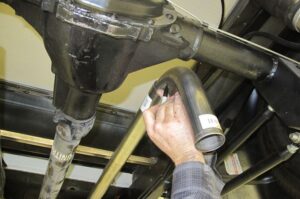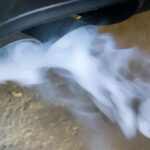Why Do I Smell Exhaust in My Car?
Welcome to technicalreader.com .If you’ve ever gotten into your car, turned the key, and suddenly thought, “Wait… why do I smell exhaust in my car?” — you’re definitely not alone. That moment when you notice it and wonder, “why do I smell exhaust in my car every time I drive?” can make any driver uneasy. That smoky, lingering scent isn’t just unpleasant — it often makes people ask, “why do I smell exhaust in my car even when the windows are up?”
Here’s the truth: asking yourself why do I smell exhaust in my car isn’t just about comfort — it’s about your safety. What seems like a minor nuisance could actually be an early warning sign that your car’s exhaust system needs attention right away.
In this guide, we’ll clearly explain why do I smell exhaust in my car, how serious it can be, and what steps you can take to fix it — all shared in a friendly, no-jargon way that makes sense even if you’re not a mechanic.

🚗 What Does “Exhaust Smell” Really Mean?
Before diving into fixes, let’s clear up what that smell is.
Your car’s exhaust carries away gases produced by your engine’s combustion. Normally, it exits safely through the tailpipe, filtered by the catalytic converter. But if something’s wrong — a leak, bad seal, or damaged part — those gases can sneak inside the cabin.
So when you wonder, “why do I smell exhaust in my car,” the truth is your car might be trying to tell you something important.
The smell may be:
-
A burnt or smoky odor
-
A sharp gasoline-like scent
-
A rotten-egg sulfur smell (usually from a bad catalytic converter)
-
Or just a faint, headache-inducing fume when idling
No matter the intensity, any exhaust odor inside your car deserves attention.
🧩 Common Causes of Exhaust Smell Inside Your Car 
1. Exhaust Leak Near the Engine or Underbody
One of the most common reasons you smell exhaust in your car is an exhaust leak.
Cracked manifolds, loose clamps, or worn gaskets can allow fumes to escape into the engine bay. From there, the ventilation system can suck those fumes into your cabin — especially if the air intake is near the leak.
If you notice a stronger smell when idling or accelerating, or even hear a soft hissing or ticking sound, that’s a big hint.
2. Failing or Clogged Catalytic Converter
If the smell reminds you of rotten eggs, you might be dealing with a catalytic converter issue.
The converter’s job is to neutralize harmful emissions. When it fails, you not only get a strong odor, but your car may run rough, lose power, or light up the check engine light.
Ignoring it can cause more damage down the line — and that smell won’t go away until it’s replaced.
3. Rich Fuel Mixture or Fuel System Problem
Ever notice your car smells like unburned gasoline? That’s often a rich fuel mixture — meaning too much fuel and not enough air is being burned.
It can happen if:
-
Your oxygen sensors are faulty
-
Your mass air flow (MAF) sensor is dirty
-
Your injectors are leaking
-
Or your air filter is clogged
This not only triggers the “why do I smell exhaust in my car” question, but also kills your fuel economy.
4. Oil or Coolant Burning on Hot Surfaces 
Sometimes what you think is exhaust might actually be oil or coolant burning.
When small leaks drip onto the exhaust manifold, the hot metal instantly burns the liquid, releasing a pungent, smoky smell.
A tiny valve cover leak or cracked hose can create the illusion of an exhaust odor — so it’s worth checking both exhaust and engine areas.
5. Cabin Air Filter or HVAC Intake Issue
If you smell exhaust only when the AC or heater is running, your cabin air filter might be clogged or your HVAC intake might be drawing outside fumes.
A dirty filter can trap odors and stop fresh air from circulating properly. Replacing it is cheap, quick, and can make a world of difference.
6. Body or Trunk Seal Damage
Ever been in a minor rear-end bump or had bodywork done? A damaged seal around the trunk or rear panels can let exhaust fumes seep in.
If the smell is strongest in the back seat or trunk area, inspect the rubber seals for cracks, tears, or misalignment.
7. Exhaust Blockage or Backpressure
Sometimes the problem isn’t a leak — it’s a blockage.
If the tailpipe is partially clogged by debris, rust, or even snow, exhaust gases might not exit properly. That pressure can push fumes back toward the cabin.
Always make sure your tailpipe is clear before driving, especially in winter. 
👃 People Also Search For (and Here’s What It Means)
Why Do I Smell Exhaust in My Car While Driving?
If you smell exhaust mainly while driving, it might be airflow-related. At higher speeds, wind pressure can push fumes into small leaks. It’s often tied to underbody exhaust leaks or loose gaskets near the firewall.
How to Fix Exhaust Smell in Car
Here’s the good news — many causes are fixable:
-
Replace gaskets or tighten loose bolts if there’s a leak.
-
Change a clogged cabin air filter.
-
Replace failing sensors or catalytic converters if needed.
-
Use outside air mode on your HVAC until fixed.
If the smell persists, get a smoke test from a mechanic. That’s the best way to locate tiny leaks.
Why Do I Smell Exhaust in My Car After Driving?
If the odor lingers after you park, it might be fumes trapped in the vents or a small oil leak burning off. It could also mean the exhaust is blowing toward the cabin because of airflow direction.
Always check the tailpipe area for leaks or loose joints — especially after long drives.
Why Do I Smell Exhaust Fumes in My Nose?
If the scent sticks around in your nose even after you leave the car, it’s a warning. You might be breathing in carbon monoxide (CO) or nitrogen oxides. Even in small doses, these can cause headaches, dizziness, or nausea.
If you feel off while driving, get fresh air immediately — and don’t drive the car again until it’s inspected
Strong Exhaust Smell When Idling
A strong exhaust odor when your car is idling often makes drivers wonder, “why do I smell exhaust in my car?” This usually means there’s a small leak near the exhaust manifold or pipe. When the vehicle isn’t moving, fumes build up faster around the cabin — that’s why why do I smell exhaust in my car becomes more noticeable at stoplights or in traffic. If the smell fades away once you start driving faster, it’s another clear sign pointing to a leak, and you’ll likely find yourself asking again, “why do I smell exhaust in my car only when it’s idling?
Smell Exhaust in Car When Heater Is On
This is a classic. When the heater is on, your car pulls warm air from near the engine. If there’s any exhaust leak under the hood, it goes straight into your vents.
If you notice this, switch your HVAC to “fresh air” mode and get the system checked ASAP.
Strong Exhaust Smell from Tailpipe
If the strong odor comes from the tailpipe itself, your car is likely running rich or has a bad catalytic converter. While it’s not as directly dangerous as fumes inside the cabin, it’s still a sign something’s off with combustion or emission control.
Exhaust Smell in Car Dangerous
Yes — absolutely. Exhaust fumes can contain carbon monoxide, which is colorless, odorless, and extremely dangerous. Even low exposure can cause fatigue, headaches, or dizziness.
Never ignore an exhaust smell. It’s not “just how cars smell” — it’s your cue to check things. 
🔧 Step-by-Step Checklist to Find and Fix the Problem
-
Open your windows immediately. Get fresh air inside the cabin.
-
Turn off recirculation mode on your AC or heater. This stops pulling in the same air repeatedly.
-
Check your cabin air filter. Replace it if it’s dark or clogged.
-
Inspect for visible exhaust leaks. Look for rust, holes, or broken hangers under the car (only when it’s cold and safe).
-
Look for oil or coolant residue. These leaks often mimic exhaust smells.
-
Check if your check engine light is on. That could indicate sensor or catalytic converter issues.
-
Visit a mechanic for a smoke test or CO detection test if you can’t find the problem.
💰 Typical Repair Costs
Here’s a general idea of what fixes might cost:
-
Minor exhaust leak: $100–$300
-
Muffler replacement: $250–$600
-
Catalytic converter replacement: $900–$2,000+
-
Oxygen sensor: $150–$400
-
Cabin filter: $30–$50
Catching issues early saves money — and keeps you safe.
🧰 DIY or Professional Help?
You can handle small stuff like changing filters or tightening clamps yourself. But for anything involving the exhaust manifold, catalytic converter, or CO detection — call a professional.
Modern vehicles have complex exhaust routing, and it’s easy to miss a small but dangerous leak.
🧠 Bonus Tip: Prevention Is Easier Than Repair
-
Replace the cabin air filter every 12 months or as your manual says.
-
Watch for rust on your exhaust system.
-
Don’t ignore the check engine light.
-
Keep tailpipes clear of debris.
-
After any accident or undercar repair, ask the shop to check for exhaust leaks.
💬 Real Talk: What I’d Do If It Were My Car
If I smelled exhaust inside my car, I’d:
-
Roll the windows down and switch off recirculation mode.
-
Pop the hood and look for visible leaks or smoke.
-
Replace the cabin air filter immediately.
-
If the smell stayed — I’d stop driving and take it to a trusted mechanic the same day.
You might love your car, but nothing’s worth breathing in exhaust fumes.
🧾 Final Thoughts
If you’ve ever wondered, “why do I smell exhaust in my car?” — remember, it’s more than just a curious question; it’s a safety signal. That odor could point to a small exhaust leak or a bigger mechanical problem, but either way, why do I smell exhaust in my car is your body’s way of alerting you before things get worse.
Cars are designed to keep fumes out and clean air in, so when that balance shifts and you start asking yourself why do I smell exhaust in my car again, it’s time to act fast. Whether it’s a quick seal repair or a part replacement, taking action protects your health, your passengers, and your ride.


